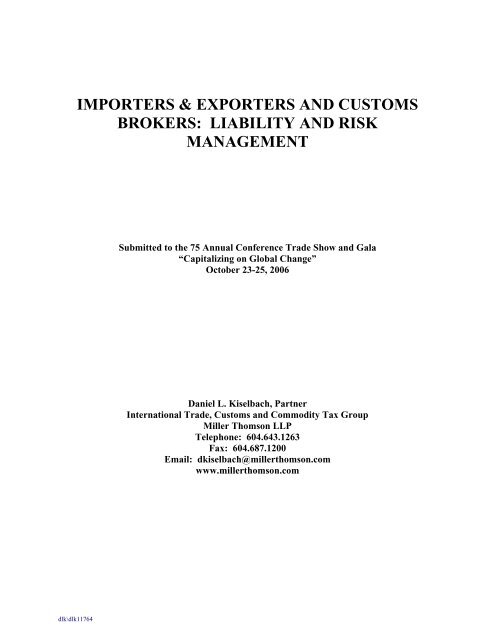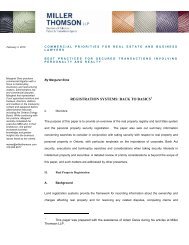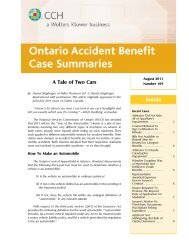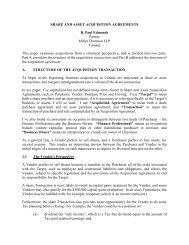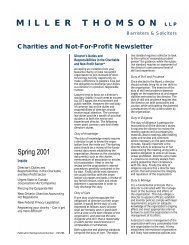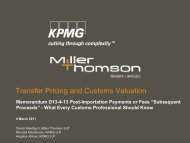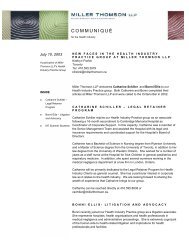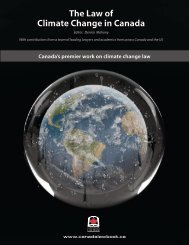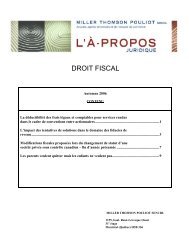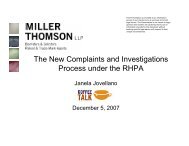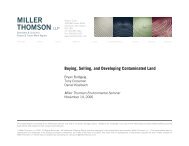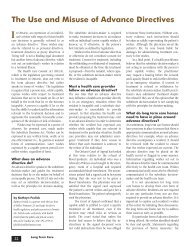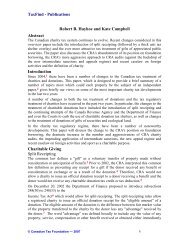importers & exporters and customs brokers - Miller Thomson
importers & exporters and customs brokers - Miller Thomson
importers & exporters and customs brokers - Miller Thomson
Create successful ePaper yourself
Turn your PDF publications into a flip-book with our unique Google optimized e-Paper software.
IMPORTERS & EXPORTERS AND CUSTOMSBROKERS: LIABILITY AND RISKMANAGEMENTSubmitted to the 75 Annual Conference Trade Show <strong>and</strong> Gala“Capitalizing on Global Change”October 23-25, 2006Daniel L. Kiselbach, PartnerInternational Trade, Customs <strong>and</strong> Commodity Tax Group<strong>Miller</strong> <strong>Thomson</strong> LLPTelephone: 604.643.1263Fax: 604.687.1200Email: dkiselbach@millerthomson.comwww.millerthomson.comdlk\dlk11764
INDEXI. INTRODUCTION ...............................................................................................................1II.III.CANADIAN LAWS AND POLICIES PERTAINING TO GENERAL AGENCYAGREEMENTS/POWER OF ATTORNEY IN CANADA................................................1US LAWS AND POLICIES................................................................................................2IV. STANDARD TRADING CONDITIONS ...........................................................................3V. COMPARISON OF STANDARD TRADING CONDITIONS (CSCB) TOSTANDARD TERMS AND CONDITIONS OF SERVICE (NCBFFAA) ........................4VI. ARE CUSTOMS BROKERS “PROFESSIONAL ADVISORS”? .....................................7VII.VIII.APPLICABLE LAWS.........................................................................................................8RISK MANAGEMENT.....................................................................................................12IX. SUMMARY AND CONCLUSION ..................................................................................13dlk\dlk11764
– 1 –I. INTRODUCTIONIMPORTERS & EXPORTERS AND CUSTOMS BROKERS:LIABILITY AND RISK MANAGEMENTImporters, <strong>exporters</strong>, <strong>customs</strong> <strong>brokers</strong> <strong>and</strong> others doing business in Canada in the area of <strong>customs</strong><strong>and</strong> trade over the past five years have encountered many new regulations <strong>and</strong> policies. Thecombination of exp<strong>and</strong>ing regulation <strong>and</strong> rapid change raises the risk that problems may arise inrespect of <strong>customs</strong> <strong>and</strong> trade matters. Many businesses have implemented self-audits or othercompliance programs which are designed to avoid the potential problems of overpaid duties <strong>and</strong>taxes, fines, penalties, loss of trade privileges or bad publicity. However, every program orsystem involving human decision-making involves some risk of human error. This paper willdiscuss the nature of the relationship between <strong>importers</strong>, <strong>exporters</strong> <strong>and</strong> <strong>brokers</strong>, <strong>and</strong> how therelationship may be better defined <strong>and</strong>, in future, help to manage rights <strong>and</strong> legal risks. 1II.CANADIAN LAWS AND POLICIES PERTAINING TO GENERAL AGENCYAGREEMENTS/POWER OF ATTORNEY IN CANADACustoms <strong>brokers</strong> represent <strong>importers</strong> <strong>and</strong> <strong>exporters</strong> in Canada as agents. Agency is a branch ofcommon law concerned with the delegation of power from one person, often called a “principal”,to another, called an “agent”. An agency agreement (sometimes referred to as a power ofattorney document) is a document stating that the principal authorizes the agent to exercisecertain powers on the principal’s behalf. Agency agreements may grant general powers orspecific powers. Various Canadian provinces have enacted legislation respecting agencyagreements, referred to as powers of attorney. 2Canada Border Services Agency (“CBSA”) Memor<strong>and</strong>um D1-6-1 “Authority to Act as Agent”explains CBSA’s policy regarding persons who wish to transact business under the Customs Actas an agent. Section 10 of the Customs Act indicates that service providers such as <strong>customs</strong><strong>brokers</strong> must enter into an agency agreement in order to transact business on behalf of <strong>importers</strong>or <strong>exporters</strong>. Section 10 reads as follows:12This paper is intended to provide a general outline of information respecting imports, <strong>exporters</strong> <strong>and</strong> <strong>customs</strong><strong>brokers</strong>. Readers should not rely upon this paper for the purpose of dealing with legal issues as it is notintended to provide legal advice. Persons seeking legal advice on specific matters should retain qualified legalcounsel.See, for example, the Power of Attorney Act, (1996) R.S.B.C. c. 370; <strong>and</strong> the Powers of Attorney Act (1990)R.S.O. c. 20.dlk\dlk11764
– 2 –Subject to the regulations, any person who is duly authorized to do so may transact business underthis Act as the agent of another person, but an officer may refuse to transact business with anysuch person unless that person, on the request of the officer, produces a written authority, in aform approved by the Minister, from the person on whose behalf he is acting.CBSA requires <strong>importers</strong> or <strong>exporters</strong> to sign a Form E639 “Agency Agreement” in order toevidence that another person, such as a <strong>customs</strong> broker, has been authorized to transact businesson behalf of the importer or exporter. CBSA takes the position that the importer or exporter, asprincipal, remains liable for the consequences arising in connection with any <strong>customs</strong>transactions competed by its <strong>customs</strong> broker. In other words, when a <strong>customs</strong> transaction takesplace, the importer or exporter is responsible for the <strong>customs</strong> transaction, even though its<strong>customs</strong> broker did things to facilitate the transaction. The laws pertaining to importing <strong>and</strong>exporting goods in Canada generally provide that the importer or exporter is responsible for thepayment of duties, taxes, penalties <strong>and</strong> interest in connection with a <strong>customs</strong> transaction.Canada Revenue Agency (“CRA”) has indicated that an importer or exporter may execute apower of attorney in the following forms in relation to tax matters:(a)(b)(c)Form E 445 – Power of Attorney given by an Incorporated Company;Form E 444 – Power of Attorney given by an Individual; orForm E 443 – Power of Attorney given by a Partnership.III.US LAWS AND POLICIESIn the United States, the entry of merch<strong>and</strong>ise appears to be governed by the Code of FederalRegulations, Title 19, Customs Duties, Part 141. Subpart C – Powers of Attorney appears to dealwith general requirements <strong>and</strong> definitions, the form of an agency agreement (described as apower of attorney), <strong>and</strong> related issues. Section 141.31 appears to indicate that a power ofattorney may be executed for the transaction of a specified part of, or all of, the <strong>customs</strong> businessof an importer or agent. Section 141.32 appears to indicate that a “Customs Form 5291 may beused for giving power of attorney to transact Customs business.”dlk\dlk11764
– 3 –The US Customs <strong>and</strong> Border Protection (“CBP”) has commented upon the custom’s broker rolein verifying or validating a power of attorney. 3A CBP notice states that:In addition to security, the broker’s own professional business interests <strong>and</strong> continuing obligationto demonstrate “reasonable care” require verification of the POA [power of attorney] grantor’sidentity in legal authority (position in a company or partnership) to enter into a POA.Here are some of the ways the broker can validate a Power of Attorney• To the greatest extent possible, have POAs completed in person so the grantor’s personalidentification (driver’s license, passport, etc.) can be reviewed.• Check applicable Web sites to verify POA grantor’s business <strong>and</strong> registration with Stateauthorities.• If the principal uses a trade or fictitious name in doing business, confirm that the nameappears on the POA.• Verify that the importer’s name, importer number <strong>and</strong> Employer Identification Number (alsoknown as the Federal Tax Identification Number) on the POA match what is in ACS.• Check whether the POA grantor is named as a sanctioned or restricted person or entity by theUS government (see the Bureau of Industry <strong>and</strong> Security, US Department of Commerce). 4IV.STANDARD TRADING CONDITIONSCustoms <strong>brokers</strong> who act for others engaged in <strong>customs</strong> transactions in Canada may use anAgency Agreement coupled with st<strong>and</strong>ard trading conditions. The Canadian Society of CustomsBrokers (“CSCB”) assists its members by publishing a General Agency Agreement <strong>and</strong> St<strong>and</strong>ardTrading Conditions. 5The CSCB’s General Agency Agreement <strong>and</strong> St<strong>and</strong>ard Trading Conditionscontains what the CSCB regards as the minimum information which should form part of anagency agreement, together with st<strong>and</strong>ard trading conditions.In the U.S. the National Customs Brokers <strong>and</strong> Freight Forwarders’ Association of America, Inc.(“NCBFFA”) appears to have published model terms <strong>and</strong> st<strong>and</strong>ard conditions of service (“Terms<strong>and</strong> Conditions of Service”) designed to form part of a <strong>customs</strong> power of attorney. The Terms345See http://www.cbp.gov.\xp\cgov\import\broker_management\validating_poa.xmlQuestions about power of attorney requirements may be addressed to the US Broker Management Branch,Trade Compliance <strong>and</strong> Facilitation, Office of Field Operations, at (202), 344-2580.See Canadian Society of Customs Brokers website: http:\www.cscb.ca\030\mb_cc_e.html <strong>and</strong> sample AgencyAgreement courtesy of Summit Customs Brokers attached as Schedule “A”.dlk\dlk11764
– 4 –<strong>and</strong> Conditions of Service promulgated by the NCBFFA seem to be similar to the CSCBSt<strong>and</strong>ard Trading Conditions.V. COMPARISON OF STANDARD TRADING CONDITIONS (CSCB) TOSTANDARD TERMS AND CONDITIONS OF SERVICE (NCBFFAA)While the St<strong>and</strong>ard Trading Conditions set out the CSCB are similar to the Terms <strong>and</strong>Conditions of Service set out by the NCBFFA, there are some differences. This is madeimmediately apparent by the fact that the NCBFFA’s Terms <strong>and</strong> Conditions of Service contain21 paragraphs, compared to the 10 paragraphs in the CSCB’s St<strong>and</strong>ard Trading Conditions. Thefollowing chart compares some of the CSCB’s St<strong>and</strong>ard Trading Conditions with the NCBFFA’sTerms <strong>and</strong> Conditions of Service.CategoryFees <strong>and</strong> DisbursementsInvoicing <strong>and</strong> PaymentAdvancement of FundsCSCBSt<strong>and</strong>ard Trading ConditionsParagraph 2 deals with paymentfees <strong>and</strong> disbursements.Paragraph 3 indicates that, amongstother things, invoices are payable onreceipt, interest may be charged onlate payments, <strong>and</strong> the broker mayhave the right to detain <strong>and</strong> sellgoods in default of payment.Paragraph 4 indicates that the clientshall advance to the <strong>customs</strong> broker,prior to release, sufficient funds toenable the broker to pay alldisbursements arising in connectionwith the shipment, failing which thebroker shall have no obligation torender services.NCBFFASt<strong>and</strong>ard Terms <strong>and</strong>Conditions of ServiceParagraphs 10 <strong>and</strong> 19 deal withpayment of charges <strong>and</strong>compensation of the broker.Paragraph 14 sets out that thebroker has a lien, <strong>and</strong> the right to sellshipments in order to recover moniesowed to the broker.Paragraph 10 indicates that allcharges must be paid by the broker’sclient in advance, unless the brokeragrees to extend credit.dlk\dlk11764
– 5 –CategoryDuties <strong>and</strong>Responsibilitiesof the ClientCSCBSt<strong>and</strong>ard Trading ConditionsParagraph 5 indicates that the clientshall, amongst other things:(a) provide all informationnecessary for the broker tocomplete services;(b) promptly review documentation<strong>and</strong> notify the broker ofinaccuracies, errors oromissions;(c) reimburse/indemnify the brokerfor any disbursements made bythe broker to pay duties, fines,penalties, interests or otherlevies or respecting loss ordamage sustained by the brokerarising from the provision ofservices;(d) indemnify the broker from anyactions, claims, suits ordem<strong>and</strong>s arising from claimsmade by third parties resultingfrom any inaccuracies, mistakesor omissions <strong>and</strong> informationprovided by the client;(e) warrant that it has the authorityto appoint the broker, that allinformation shall be complete,true <strong>and</strong> accurate, <strong>and</strong> that thebroker shall rely upon the client’sinformation.NCBFFASt<strong>and</strong>ard Terms <strong>and</strong>Conditions of ServiceSimilarly, paragraph 6 indicates that:• the customer is required toreview all documentationprepared for the purpose ofclearing goods <strong>and</strong> willimmediately advise the brokerof any errors, discrepancies,incorrect statements oromissions;• that the broker relies upon theaccuracy of documents supplied<strong>and</strong> the customer shall usereasonable care to ensure thecorrectness of information;• that the customer shallindemnify the broker from anyclaims asserted or any liabilitysuffered as a result of thecustomer’s failure to discloseinformation or the provision ofany incorrect or false statement.dlk\dlk11764
– 6 –CategoryDuties <strong>and</strong>Responsibilitiesof the BrokerSubject LimitationPeriod for ClaimsCSCBSt<strong>and</strong>ard Trading ConditionsParagraph 6 indicates that:• The broker shall provide servicein accordance with generallyaccepted st<strong>and</strong>ards of theCanadian <strong>customs</strong> brokerageindustry.• All information shall be keptconfidential.• The broker shall take reasonablesteps to provide service inaccordance with instructions, buthas authorization to depart fromthe client’s instructions, <strong>and</strong>shall be indemnified for doingso.• The broker shall provide a copyof accounting documents/data.• The broker shall report <strong>and</strong>account for all funds received, tothe extent that the funds are forthe credit of the client, or fromthe client by way of advances.• The broker is not be liable forany error of judgment, anythingit may do or refrain from doing,or consequential damage or losscaused by the negligence of thebroker, by an act of God or otheract or cause beyond thereasonable control of the broker.It is not be liable for any failureto provide services which is theresult of the operation of thelaws of Canada.Paragraph 7 indicates that any errorsor omissions on <strong>customs</strong> documentsor data transmissions must bereported in writing to the broker bythe client as soon as possible, but nolater than 10 days after the receipt ofthe documents or data, <strong>and</strong> thebroker is not responsible for anyerrors or omissions unless they arereported within that 10-day period.NCBFFASt<strong>and</strong>ard Terms <strong>and</strong>Conditions of ServiceParagraph 11 indicates that thecustomer will indemnify the brokerfrom any claims arising from theimportation or exportation of theclient’s goods <strong>and</strong> any conduct of thecustomer which violates any laws.Paragraph 2 indicates that the brokeris authorized to perform duties inconnection with the entry <strong>and</strong> releaseof goods, post-entry services,securing of export licenses <strong>and</strong> filingof export documentation.Paragraph 9 contains a limitation ofliability <strong>and</strong> indicates, amongst otherthings that the broker shall only beliable for negligence which is thedirect <strong>and</strong> proximate cause of anyinjury to the customer, including lossor damage to the customer’s goods.Paragraph 3 indicates that all claimsmust be made in writing <strong>and</strong> receivedwithin 90 days of the event giving riseto the claim. Any failure to givetimely notice is a complete defence toany action. All actions must becommenced within specified timeperiods, for example, in respect ofocean transportation – within oneyear of the date of the loss.dlk\dlk11764
– 7 –CategoryGoverning LawCSCBSt<strong>and</strong>ard Trading ConditionsParagraph 9 indicates that theconditions are governed by the lawsof the province or territory withinCanada within which the broker hasits principal place of business.NCBFFASt<strong>and</strong>ard Terms <strong>and</strong>Conditions of ServiceParagraph 21 contains a governinglaw <strong>and</strong> consent to jurisdiction/venueclause.VI.ARE CUSTOMS BROKERS “PROFESSIONAL ADVISORS”?Few reported cases deal with the role of <strong>customs</strong> <strong>brokers</strong> <strong>and</strong> their clients. Accountants,engineers, architects, social workers, real estate <strong>brokers</strong>, journalists <strong>and</strong> management consultantshave been found to be performing professional work or to be professionals. This suggests that<strong>customs</strong> <strong>brokers</strong> might be found to be performing professional work or to be professionals. If<strong>customs</strong> <strong>brokers</strong> can be characterized as professional advisors, an analogy might be drawn tocases dealing with, for example, 6 professional advisors such as accountants <strong>and</strong> auditors.There is no all-inclusive definition of a professional. Certain factors may be considered indetermining whether an occupation is a profession. The first factor is whether the work is skilled<strong>and</strong> specialized, derived from training or experience, <strong>and</strong> is mental or intellectual rather thanmanual. Customs <strong>brokers</strong> carry out skilled <strong>and</strong> specialized work, derived from training orexperience. Their work is knowledge-based <strong>and</strong> intellectual in nature.The second factor is whether the persons in the occupation are expected to be committed tohigher st<strong>and</strong>ards of service <strong>and</strong> principles for the benefit of their clients <strong>and</strong> the community.Customs <strong>brokers</strong> are expected to be committed to st<strong>and</strong>ards of service, including the generallyaccepted st<strong>and</strong>ards of the Canadian Customs Brokerage Industry, which are referred to in theCSCB’s St<strong>and</strong>ard Trading Conditions.A third factor is whether the persons practicing in a profession are members of an associationthat regulates admissions <strong>and</strong> st<strong>and</strong>ards for the profession. Customs <strong>brokers</strong> are not required tobelong to an association but, as noted above, certain industry st<strong>and</strong>ards may apply, <strong>and</strong> they are6John A. Campion <strong>and</strong> Diana W. Dimmer, Professional Liability in Canada (<strong>Thomson</strong> Canada Limited Toronto,1994, page 1-1 <strong>and</strong> the cases referred to in notes 1, 2, 3, 4, 5 <strong>and</strong> 6dlk\dlk11764
– 8 –governed by the provisions of the Customs Act. Subsection 9(4) of the Customs Act prohibitspersons from transacting or attempting to transact business as a <strong>customs</strong> broker, or holdingthemselves out as a <strong>customs</strong> broker, unless: (1) the person holds a licence; or (2) is qualifiedunder the regulations <strong>and</strong> is authorized to transact business as a <strong>customs</strong> broker by a person whoholds a licence. 7 The Customs Brokers Licensing Regulations 8 sets out the prescribedqualifications for <strong>customs</strong> <strong>brokers</strong>, the form of an application for a license, the terms <strong>and</strong>conditions of the authorization, conditions respecting the <strong>customs</strong> broker’s qualifyingexamination, records keeping requirements <strong>and</strong> other related issues.VII.APPLICABLE LAWSWhat laws might be applied when resolving a dispute concerning the rights <strong>and</strong> duties of partieswho have entered into an Agency Agreement? The parties may designate the laws <strong>and</strong> thejurisdiction that may apply to the terms <strong>and</strong> conditions of the service <strong>and</strong> define the relationshipbetween the parties. The parties may also specify the mode of dispute resolution (includingm<strong>and</strong>atory mediation, arbitration <strong>and</strong>/or litigation). Canadian courts may consider <strong>and</strong> determinea claim brought in Canada respecting a <strong>customs</strong> transaction where the claim sets out factsshowing the existence of sufficient ties to Canada. 9If a <strong>customs</strong> dispute is determined by a Canadian court, the legislation <strong>and</strong> cases relating tonegligence, contract <strong>and</strong> breach of fiduciary duty may apply. Central Trust v. Rafuse 10 indicatesthat concurrent liability for negligence <strong>and</strong> breach of contract may exist in matters involvingprofessional advisors. For concurrent liability to exist, the duty of care must arise independentlyof the contractual obligations in the sense that duty must not depend upon the obligations createdby the contract. 117891011Customs Act, R.S.C., 1985, c. 1 (2 nd Supp.)S.O.R./86-1067CB Distribution Inc. o/a Upper Canada Malt Company <strong>and</strong> BCB International Inc. 2003 CanLII 29523(Ont. S.C.)(1986), 31 D.L.R. (4 th ed.) 481 (SCC), varied [1988] 1 S.C.R. 1206B.G. Checho International Ltd. v. British Columbia Hydro & Power Authority, [1993] 1 S.C.R. 12; Queen v.Cognose Inc., [1993] 1 F.C.R. 87; M.A.N.-B&W Diesel v. Kingsway Transports Ltd. (1997), 33 O.R. (3d) 355(C.A.) at 361dlk\dlk11764
– 9 –The failure to take action (an omission), as well as the taking of improper action may constitutethe basis for a dispute. In Donoghue v. Stephensen, 12 the House of Lords noted that reasonablyprudent persons must take reasonable care to avoid acts or omissions which one can reasonablyforsee would be likely to injure that person’s neighbour.What is reasonable <strong>and</strong> prudent depends on the circumstances. For example, consider the role ofa <strong>customs</strong> broker who, under an Agency Agreement, has the power <strong>and</strong> discretion to do what isnecessary to facilitate a <strong>customs</strong> transaction. To what extent is this <strong>customs</strong> broker generallyresponsible to protect its client’s interests? Some guidance might be obtained from the case lawwhich indicates that, in certain cases, the failure to properly advise a client may be actionablewhere broad powers have been assumed.For example, in Midl<strong>and</strong> Mortgage Corporation v. Jawl & Bundon, 13a lawyer was found to benegligent for failing to give certain advice with respect to the legal effect of a mortgage ordebenture charge against a lease. In Lemieux v. Gibney-McCullough 14 a solicitor acting on a saleof business was liable to a client for failing to protect the client’s interest <strong>and</strong> failing to keep theclient informed as to what was going on.Consider also whether <strong>customs</strong> advice or opinions are sought or required. Opinions may, forexample, relate to matters such as how legislation should be interpreted or applied, <strong>and</strong> the effector legality of a transaction. If a professional uses adequate skill <strong>and</strong> knowledge in forming theopinion, the fact that it may be incorrect does not mean that it was negligently given. SeeOrmindale Holdings Ltd. v. Ray, Wolfe, Connell, Lightbody & Reynolds. 15Liability arises wherethere is negligence, as opposed to an error in judgment.Professionals may be under an obligation to advise a client that there are risks which may flowfrom relying upon the correctness of an opinion, particularly in cases involving unsophisticated12131415[1932], A.C. 562(1997), 33 C.C.L.T. (2d) 248 (BCSC), additional reasons at (1997), 9 C.P.C. (4 th ) 236 (BCSC), reversed,(1999), 62 B.C.L.R. (3d) 239 (C.A.), additional reasons, (1999), 64 B.C.L.R. (3d) 1 (CA) leave to appealrefused (2000), 260 N.R. 392 (note) (SCC)(2001), 55 O.R. (3d) 520 (S.C.J.)(1980), 116 D.L.R. (3d) 346 (BCSC), affirmed (1982), 36 B.C.L.R. 378 (BCCA)dlk\dlk11764
– 10 –clients. 16Further, professionals might have an obligation to obtain information which mightaffect their opinions. In Revelstoke Credit Union v. <strong>Miller</strong> [1984], 2 W.W.R. 297, 28 CCLT 17,24 B.L.R. 271 (BCSC), the Court indicated that an auditor who has an opportunity to acquireinformation that might affect his opinion, but fails to recognize <strong>and</strong> act on that information, maybe responsible for negligence.How might one determine whether a duty of care arises <strong>and</strong> the applicable st<strong>and</strong>ard of care? Inassessing whether a professional has performed his or her duties with the requisite reasonablecare <strong>and</strong> skill, one may refer to the scope of work listed in any contract, <strong>and</strong> the st<strong>and</strong>ard of careapplicable to the profession. In the case of <strong>customs</strong> <strong>brokers</strong> <strong>and</strong> their clients, it may be useful todescribe the nature of the work which will (or will not) be undertaken by the <strong>customs</strong> broker.The st<strong>and</strong>ard of care required in the circumstances may be influenced by the st<strong>and</strong>ard orcommon practices which have been accepted in the custom brokerage community in similarcircumstances. Compliance with custom, however, is not conclusive evidence of reasonablecare. 17Another question arises as to the extent to which the principles of fiduciary duty might apply to<strong>customs</strong> <strong>brokers</strong>. Again, several factors may be considered in determining whether or not afiduciary relationship exists. The first factor is the scope for the exercise of some discretion orpower. Customs <strong>brokers</strong> may be provided with a general power together with instructions to dowhat is necessary to facilitate <strong>customs</strong> transactions.The second factor is whether the power or discretion can be exercised unilaterally so as to affectthe principal’s legal or practical interests. As noted above, a <strong>customs</strong> broker may be providedwith the power or discretion to affect the client’s legal or practical interests in relation to the1617Ormindale Holdings Ltd. Ray, Wolfe, Connell, Lightbody & Reynolds, supra, <strong>and</strong> 285614 Alberta Ltd. v.Burnet, Duckworth & Palmer, [1993] 4 W.W.R. 374 (Alta Q.B.) at 382Kauffman v. Toronto Transit Commission, [1959] O.R. 197 (Ont CA.) affirmed, [1960] S.C.R. 251 (SCC) <strong>and</strong>McDaniel v. Vancouver General Hospital (1933), [1934] 1 D.L.R. 557 (BCCA), reversed [1934] 4 D.L.R. 593(T.C.); Harrington, Guardian ad litem of v. Harrington (1998), 55 B.C.L.R. (3d) 305 BCSC; James v. RiverEast School (District No. 9), [1973] 2 W.W.R. 577 (Man. CA) <strong>and</strong> Penner v. Theobald (1962), 40 W.W.R. 216(Man. CA)dlk\dlk11764
– 11 –clearing of goods, the payment of duties, the making of refund applications, <strong>and</strong> similaractivities. 18The third factor is the existence of a peculiar vulnerability on the part of the client to the exerciseof that discretion or power. Unsophisticated <strong>importers</strong> or <strong>exporters</strong> may be vulnerable <strong>and</strong>depend upon the exercise of discretion or power on the part of the <strong>customs</strong> broker.The principles applicable to fiduciaries are set out in Hodgkinson v Simms. 19There, the SupremeCourt of Canada indicated that a fiduciary owes not only a duty of skill <strong>and</strong> competence, butdoes owe a duty of trust, loyalty <strong>and</strong> confidentiality. It indicated that a party becomes a fiduciarywhere it acts under a statute, agreement or otherwise <strong>and</strong> has an obligation to act for the benefitof another, carrying with it its discretionary power.In Hodgkinson v. Simms the Court considered the claim of a stockbroker who sued an accountantwho specialized in providing tax shelter advice. The stockbroker relied on the advice <strong>and</strong> thestockbroker did not question the accountant about the reasons underlying the advice. Theaccountant advised the stockbroker to invest in real estate investment projects which appeared tobe safe. The stockbroker bought the investments on the accountant’s advice <strong>and</strong> lost moneywhen the value of the investments fell. The stockbroker claimed that the accountant was actingfor real estate developers during the relevant period. The stockbroker said that he would nothave invested in the investments had he known the true nature of the accountant’s relationshipwith the developers.The Court indicated that the accountant owed a fiduciary duty to the stockbroker <strong>and</strong> was liablefor breach of fiduciary duty. 20In its reasons for judgment the Court quoted the decision ofKeenan, J. in Varcoe v Sterling, 21 which discussed the fiduciary duty principle in a broker-clientrelationship:18192021The agency agreement <strong>and</strong> St<strong>and</strong>ard Trading Conditions set out by the CSCB go so far under paragraph 6(c) asto provide a <strong>customs</strong> broker with the discretion to depart from a client’s instructions when it reasonablyconsiders that it is in the best interests of the client to do so.[1994] 3 S.C.R. 377per La Forest, L’Heureux-Dubé <strong>and</strong> Gonthier, J.J.(1992), 7 O.R. (3d) 204 (Gen. Div.)dlk\dlk11764
– 12 –The relationship of the broker <strong>and</strong> client is elevated to a fiduciary level when the client reposestrust <strong>and</strong> confidence in their broker <strong>and</strong> relies on the broker’s advice in making business decisions.When the broker seeks or accepts the client’s trust <strong>and</strong> confidence <strong>and</strong> undertakes to advise, thebroker must do so fully, honestly <strong>and</strong> in good faith . . . It is the trust <strong>and</strong> reliance placed on theclient which gives to the broker the power <strong>and</strong> in some cases, discretion, to make a businessdecision for the client. Because the client has reposed that trust <strong>and</strong> confidence <strong>and</strong> has given overthat power to the broker, the law imposes a duty on the broker to honour that trust <strong>and</strong> respondaccordingly.In adopting that statement, the Supreme Court of Canada stated as follows:In my view, this passage represents an accurate statement of fiduciary law in the context ofindependent professional advisory relationships, whether the advisors be accountants,stock<strong>brokers</strong>, bankers or investment counsellors. Moreover, it states that principle <strong>and</strong> workabledoctrinal approach. Thus, where a fiduciary duty is claimed in the context of a financial advisoryrelationship, it is at all events a question of fact as to whether the parties’ relationship was such asto give rise to fiduciary duty on the part of the advisor.The court also noted that maintaining the integrity of the market place is an important policyreason for holding that a fiduciary duty exists.VIII. RISK MANAGEMENTHaving regard to the above information, what steps might be taken by <strong>importers</strong>, <strong>exporters</strong> <strong>and</strong><strong>customs</strong> <strong>brokers</strong> to protect their interests <strong>and</strong> to avoid future disputes? Here are a few ideas.1. Ensure that the Agency Agreement accurately sets out the nature of the power to beprovided by the importer or exporter <strong>and</strong> to be assumed by the <strong>customs</strong> broker. If the <strong>customs</strong>broker is not expected, for example, to exercise its power <strong>and</strong> discretion with respect to themaking of refund claims, then consider whether it is advisable to draft an Agency Agreementwhich reflects the intention of the parties.2. Ensure that any terms <strong>and</strong> conditions accurately sets out the task to be undertaken by the<strong>customs</strong> broker on behalf of the importer or exporter. Consider drafting terms <strong>and</strong> conditions orattaching a checklist to be attached to the Agency Agreement which lists the types of servicesthat the client expects the <strong>customs</strong> broker to provide. For example, does the client expect the<strong>customs</strong> broker to review the descriptions <strong>and</strong> depictions of the goods that the client is importingon an annual basis to ensure that all previous classification decisions continue to be accurate?3. Ensure that the parties agree as to what role each of them has in ensuring that each task iscomplete. For example, some <strong>importers</strong> may assume responsibility for determining the value forduty of goods based upon the price paid or payable in respect of goods. Other <strong>importers</strong> in moredlk\dlk11764
– 13 –complex <strong>customs</strong> transactions may need to obtain advice as to the proper valuation of goods. Inother words, determine whether or not the client expects the <strong>customs</strong> broker to simply fill out theform, or whether the <strong>customs</strong> broker is to make further inquiries <strong>and</strong> elicit further information.4. Determine whether the St<strong>and</strong>ard Trading Conditions address all of the issues that may beof concern to the parties. For example, consider whether or not the parties would be served byspecifying that any disputes should be first referred to arbitrator.5. Determine whether there are any other features which are part of the St<strong>and</strong>ard TradingConditions, such as time limitations with respect to the bringing of claims, which do not meet theneeds or interests of the parties.IX.SUMMARY AND CONCLUSIONThis paper has referred to some of the laws, policies <strong>and</strong> agreements that pertain to <strong>customs</strong><strong>brokers</strong>, <strong>importers</strong> <strong>and</strong> <strong>exporters</strong>. Canadian <strong>customs</strong> <strong>brokers</strong> often use agency agreements withSt<strong>and</strong>ard Trading Conditions which set out st<strong>and</strong>ardized conditions that define the relationshipbetween <strong>customs</strong> <strong>brokers</strong> <strong>and</strong> their clients. Similarly, US <strong>customs</strong> <strong>brokers</strong> may use CustomsPowers of Attorney, together with an acknowledgement of Terms <strong>and</strong> Conditions of Service,which set out <strong>and</strong> define the relationship between US <strong>customs</strong> <strong>brokers</strong> <strong>and</strong> their clients. TheSt<strong>and</strong>ard Terms <strong>and</strong> Conditions used in both Canada <strong>and</strong> the US appear to be similar. Customs<strong>brokers</strong> might be characterized as professionals, <strong>and</strong> may be subject to the laws which havedeveloped in the areas of negligence, contracts <strong>and</strong> fiduciary duty. As such, it is in the interestsof both <strong>customs</strong> <strong>brokers</strong> <strong>and</strong> their clients to take steps to draft Agency Agreements <strong>and</strong> terms <strong>and</strong>conditions that precisely define their roles <strong>and</strong> responsibilities.dlk\dlk11764


